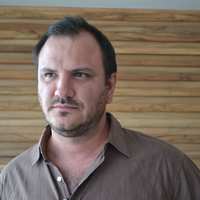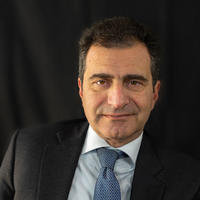
Darragh Golden
Related Authors
Josiah Heyman
University of Texas at El Paso (UTEP)
Marco Hauptmeier
Cardiff University
Nina Glick Schiller
The University of Manchester
Armando Marques-Guedes
UNL - New University of Lisbon
Olivier COSTA
Sciences Po, Paris
Eduardo Domenech
Universidad Nacional de Córdoba
Mauro Grondona
University of Genova
Nicola Lupo
LUISS Guido Carli
doriana floris
University of Tuscia (Università degli Studi della Tuscia, Viterbo)
Luis Moreno
CSIC (Consejo Superior de Investigaciones Científicas-Spanish National Research Council)










Uploads
Books by Darragh Golden
Summary
Processes of neoliberal globalization have put national trade unions under pressure as the transnational organization of production puts these labour movements in competition with each other. The global economic crisis has intensified these pressures further. And yet, economic and political integration processes have also provided workers with new possibilities to organize resistance.Emphasizing the importance of agency, this book analyzes transnational labour action in times of crisis, historically and now. It draws on a variety of fascinating cases, across formal and informal collectives, in order to clarify which factors facilitate or block the formation of solidarity. Moving beyond empirical description of cases to an informed understanding of collective action across borders, the volume provides an insightful theorization of transnational action.
Endorsements
This volume makes a timely contribution to debates about class and global solidarity. Combining rigorous theoretical analysis with rich empirical data, the importance of the volume is not only in its scholarly contribution, but its engaged approach focusing on how the relationships between labour, new social movements and migrant workers are critical to social justice and potentially wider transformation. Jane Hardy, Professor of Political Economy, University of Hertfordshire
In the present situation when old social models are being eroded at the bottom and trade union rights are attacked from above, this book shows the necessity for unions to act as a collective intellectual and to bring together labour migrants and resident wage earners in the same organization. Roy Pedersen, President of the Norwegian Confederation of Trade Unions in Oslo
A highly original collection drawing upon several disciplines, this book investigates the possibilities of labour exercising agency in a global economy. Ranging over a wide diversity of theories, topics and geographic areas the chapters show where and when labour action shapes the world we live in. An excellent up-to-date engagement with global labour dynamics. Robert O'Brien, Professor of Global Labour Issues, McMaster University
Table of Contents
Introduction: The Structuring Conditions of the Global Economy and Possibilities of Agency, Andreas Bieler, Roland Erne, Darragh Golden, Idar Helle, Knut Kjeldstadli, Tiago Matos and Sabina Stan / Part I: Class Formation / 1. The Crisis of the World’s Old Labour Movements, Marcel van der Linden / 2. Farewell to Europe’s Working Classes: Welcome the Making of the European Working Class?, Ingo Schmidt / 3. Free Trade and Transnational Labour Solidarity: Structural and Agential Challenges for the 21st Century, Andreas Bieler / 4. Mass Strikes in Brazil, South Africa and India after 2008 – Separate Battles, but a United Struggle?, Jörg Nowak / Part II. Transnational Action – Past and Present / 5. Trade Union Internationalism and European integration: A Critical Evaluation, Darragh Golden / 6. A Closed Nation or an Open Working Class? When do Unions Opt for Including Labour Migrants?, Knut Kjeldstadli / 7. A Pyrrhic Victory? A Case of National Unions and Immigrant Workers Returned, Tiago Matos / Part III. Power and Strategy / 8. Labour after Globalisation: Old and New Sources of Power, Eddie Webster / 9. Power, Labour and Globalisation: How Context-Appropriate Strategies Help Transnational Labour Alliances Succeed, Marissa Brookes / 10. Governance Struggles and Worker Power: The New Spirit of Labour Transnationalism, Jamie K. McCallum/ 11. What Role Can Trade Union Education Play in Enhancing Transnational Labour Solidarity?, Bianca Föhrer / Part IV. Varieties of Internationalism / 12. Pathways of Influence: Transnational Activism and Labour Rights in China, Sabrina Zajak / 13. Labour in the Era of Transnational Migration, What Prospects for International Solidarity, Jenny Jungehülsing / 14. Towards a ‘Cosmopolitan’ Labour Movement? Managerial and Mobilising Dynamics in International Trade Unionism, Charles Umney / Conclusion: Questions for the Future: Towards an Analytical Framework, Knut Kjeldstadli, Andreas Bieler, Roland Erne, Darragh Golden, Idar Helle, Tiago Matos and Sabina Stan
Papers by Darragh Golden
Summary
Processes of neoliberal globalization have put national trade unions under pressure as the transnational organization of production puts these labour movements in competition with each other. The global economic crisis has intensified these pressures further. And yet, economic and political integration processes have also provided workers with new possibilities to organize resistance.Emphasizing the importance of agency, this book analyzes transnational labour action in times of crisis, historically and now. It draws on a variety of fascinating cases, across formal and informal collectives, in order to clarify which factors facilitate or block the formation of solidarity. Moving beyond empirical description of cases to an informed understanding of collective action across borders, the volume provides an insightful theorization of transnational action.
Endorsements
This volume makes a timely contribution to debates about class and global solidarity. Combining rigorous theoretical analysis with rich empirical data, the importance of the volume is not only in its scholarly contribution, but its engaged approach focusing on how the relationships between labour, new social movements and migrant workers are critical to social justice and potentially wider transformation. Jane Hardy, Professor of Political Economy, University of Hertfordshire
In the present situation when old social models are being eroded at the bottom and trade union rights are attacked from above, this book shows the necessity for unions to act as a collective intellectual and to bring together labour migrants and resident wage earners in the same organization. Roy Pedersen, President of the Norwegian Confederation of Trade Unions in Oslo
A highly original collection drawing upon several disciplines, this book investigates the possibilities of labour exercising agency in a global economy. Ranging over a wide diversity of theories, topics and geographic areas the chapters show where and when labour action shapes the world we live in. An excellent up-to-date engagement with global labour dynamics. Robert O'Brien, Professor of Global Labour Issues, McMaster University
Table of Contents
Introduction: The Structuring Conditions of the Global Economy and Possibilities of Agency, Andreas Bieler, Roland Erne, Darragh Golden, Idar Helle, Knut Kjeldstadli, Tiago Matos and Sabina Stan / Part I: Class Formation / 1. The Crisis of the World’s Old Labour Movements, Marcel van der Linden / 2. Farewell to Europe’s Working Classes: Welcome the Making of the European Working Class?, Ingo Schmidt / 3. Free Trade and Transnational Labour Solidarity: Structural and Agential Challenges for the 21st Century, Andreas Bieler / 4. Mass Strikes in Brazil, South Africa and India after 2008 – Separate Battles, but a United Struggle?, Jörg Nowak / Part II. Transnational Action – Past and Present / 5. Trade Union Internationalism and European integration: A Critical Evaluation, Darragh Golden / 6. A Closed Nation or an Open Working Class? When do Unions Opt for Including Labour Migrants?, Knut Kjeldstadli / 7. A Pyrrhic Victory? A Case of National Unions and Immigrant Workers Returned, Tiago Matos / Part III. Power and Strategy / 8. Labour after Globalisation: Old and New Sources of Power, Eddie Webster / 9. Power, Labour and Globalisation: How Context-Appropriate Strategies Help Transnational Labour Alliances Succeed, Marissa Brookes / 10. Governance Struggles and Worker Power: The New Spirit of Labour Transnationalism, Jamie K. McCallum/ 11. What Role Can Trade Union Education Play in Enhancing Transnational Labour Solidarity?, Bianca Föhrer / Part IV. Varieties of Internationalism / 12. Pathways of Influence: Transnational Activism and Labour Rights in China, Sabrina Zajak / 13. Labour in the Era of Transnational Migration, What Prospects for International Solidarity, Jenny Jungehülsing / 14. Towards a ‘Cosmopolitan’ Labour Movement? Managerial and Mobilising Dynamics in International Trade Unionism, Charles Umney / Conclusion: Questions for the Future: Towards an Analytical Framework, Knut Kjeldstadli, Andreas Bieler, Roland Erne, Darragh Golden, Idar Helle, Tiago Matos and Sabina Stan